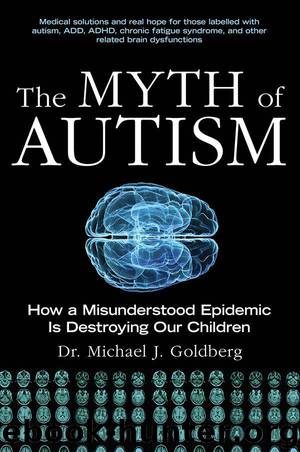The Myth of Autism: How a Misunderstood Epidemic Is Destroying Our Children, Expanded and Revised Edition by Michael J. Goldberg

Author:Michael J. Goldberg [Goldberg , Michael J.]
Language: eng
Format: epub
Publisher: Skyhorse Publishing
Published: 2014-07-29T07:00:00+00:00
Why are we not applying new technologies, using new abilities to make more educated, directed judgments in any attempt to diagnose a learning dysfunction in a child and with any application of a neurotropic agent. How much harm do physicians allow to happen iatrogenically, by not using newer imaging, new tools in a far more constructive manner? Happily, the NeuroSPECT has helped guide therapy decisions for me while continuing to push for access to agents, therapies that could in theory end this one day for children and adults.
I am opposed to any neurotropic agent that does not act in a manner one can rationalize as healthy for the patient or their brain. Most meds acting in a neurotropic manner would never meet this criterion. Sadly, among the many medications being given more and more frequently to children (and adults) are what are called stimulant medications. The starting point was Ritalin and old-fashioned amphetamines, but most newer ones are merely variations of the same. Sadly, parents are not told that any of these stimulant-based medications are just like giving a child cocaine. There are many studies in the literature now supporting that Ritalin is just like cocaine, only stronger. I’ve yet to see a study saying or implying a brain was healthier with cocaine. While sometimes, with the general stresses these children’s brain have been through, I have been encouraged to be open to very low dosages; I remain quite concerned that at normal dosing, especially when used with a mixed or quiet ADHD child, particularly with no SSRI support of the temporal lobes, one has a high chance of decreasing function in key, critical cognitive areas of their brains. Sadly, as noted previously, this misuse may now be a key reason contributing to the ongoing discussions of the “dumbing-down” of our school-age children.
When working with a child (or adult), one must start with a reminder that like any person, any biological organism, these children have multiple variables that may affect their moods, their actions, their attitudes, their performance. Not understanding these are potentially normal children who are uncomfortable, do not feel good, is missing part of the immediate battle to do the right thing to help that child (or adult). It is a completely different tactic or response when a child is acting out because they do not feel well, are in pain, versus the oppositional behavior or attempts to resist learning of a child who is now brighter and in theory does feel much better, but just doesn’t want to cooperate. Just like any of us, these children become much more receptive to learning, much more productive, when their brains are functioning, not foggy or zoney, not constantly uncomfortable. I would politely challenge any reader of this book how they would have done in school (educationally or developmentally) if in a constant fog or zone, often in pain. In no other area is the crossover more graphic than thinking about the spaciness, zoneyness, brain-fog of a child with autism/PDD,
Download
This site does not store any files on its server. We only index and link to content provided by other sites. Please contact the content providers to delete copyright contents if any and email us, we'll remove relevant links or contents immediately.
I Capture the Castle by Dodie Smith(2034)
The Heavy by Dara-Lynn Weiss(1806)
Aspergirls by Rudy Simone(1696)
Be Different by John Elder Robison(1646)
Autism's False Prophets by Paul A. Offit(1535)
My Child's Different by Elaine Halligan(1513)
Smart but Scattered—and Stalled by Richard Guare(1498)
101 Tips for the Parents of Boys with Autism by Ken Siri(1482)
Asperger Syndrome (Autism Spectrum Disorder) and Long-Term Relationships by Ashley Stanford(1424)
What's Making Our Children Sick? by Michelle Perro(1415)
ADHD by Mark Selikowitz(1391)
Girlish by Lara Lillibridge(1385)
On Immunity: An Inoculation by Biss Eula(1358)
Nerdy, Shy, and Socially Inappropriate by Cynthia Kim(1347)
An Adult with an Autism Diagnosis by Gillan Drew(1343)
Animal-assisted Interventions for Individuals with Autism by Temple Grandin(1328)
Sarah's Child (Hqn Romance) by Linda Howard(1311)
The Cities by K.A Knight(1306)
Seeing Ezra by Kerry Cohen(1304)
